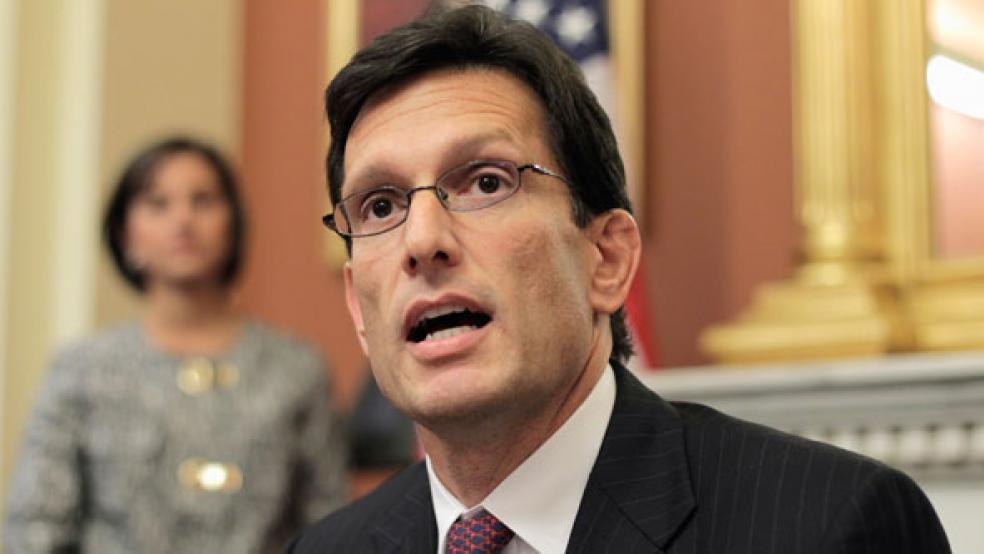Not all the wailing and gnashing of teeth over House Majority Leader Eric Cantor’s stunning primary loss to economics professor Dave Brat in last night’s Republican primary is coming from the leader’s Capitol Hill offices. The business community today is reeling from Cantor’s defeat – and not just because he has long been an advocate of business-friendly regulatory and tax policy.
The business community is also upset about why Cantor lost. Two of the biggest criticisms of Cantor that Brat, a Tea Party activist, raised in the race were the majority leader’s support of of immigration reform and his reluctant willingness to raise the nation’s debt ceiling – both issues that powerful business lobbies, such as the Chamber of Commerce, supported.
Related: Meet David Brat, the New Tea Party Giant-Killer
None of this is to say that Brat will have particular influence on either of these issues when, as is most likely, he wins Cantor’s seat in November. Freshmen members of the House have little legislative clout. What happened on Tuesday is that members with much more seniority got the message that if they cross the base on issues like immigration and the debt limit, they do so at the risk of losing their seat. And that’s bad news for the U.S. economy and U.S. businesses.
The Bipartisan Policy Center has predicted that immigration reform would add jobs and reduce the federal deficit by $1.2 trillion over 20 years. Indeed, immigration reform is seen as a huge potential economic boost to the country by most economists across the political spectrum, including conservative Republicans.
Writing in favor of reform, Diana Furchtgott-Roth of the Manhattan Institute argued that a more flexible system would “dramatically improve” the growth rate of the U.S. economy and bemoaned the “misguided history of America's political opposition to immigration.”
Republican economist and former Congressional Budget Office director Douglas Holtz-Eakin, now head of the American Action Forum, said, “Regardless of how it gets done, immigration reform is a pro-growth policy that will raise growth, strengthen housing markets, and firm up our nation’s finances.”
Related: Cantor, Ryan, Rubio, Rush – Who Speaks for the GOP?
While most support in Congress for immigration reform is on the Democratic side of the aisle, a number of Republicans have also spoken in favor of the issue, Cantor among them. Brat attacked him relentlessly on this. After Cantor said he favored allowing illegal immigrants who enter the country as children to have a path to citizenship, Brat blasted him for advocating “amnesty.”
By showing that support for reform is a major vulnerability to even a candidate as strong as Cantor appeared to be, Brat’s victory takes the possibility of near-term improvement of our immigration system, and its attendant economic benefits, off the table.
Also worrisome to some is Brat’s insistence that the debt ceiling, which limits the amount of debt the federal government can carry, must not be raised.
In an interview with Slate in May, Brat said, “My commitment is not to increase spending; to have a spending bill where you don’t increase it. Cantor voted for 10 of the last 15 debt ceiling increases. I just don’t buy the idea that you are truly put in the position of backing the debt ceiling increase the last minute, that you had no choice.”
Related: A Long Wait at the Back of the Immigration Line
The debt ceiling fights common in Washington since 2010 have rocked financial markets, and led to a government shutdown in 2013, which slowed the country’s recovery from the Great Recession.
Brat’s insistence that the debt ceiling not be raised is more nuanced than the position of, say, Texas Republican Sen. Ted Cruz, one of the key architects of the shutdown last year. Brat is not advocating a shutdown – he wants to slash spending so dramatically in the budget process that the government doesn’t need to borrow at all, making the debt limit debate superfluous.
The draconian spending cuts engineered as part of the debt ceiling deals in 2011 took a huge toll on the U.S. economy – something the Federal Reserve euphemistically referred to as “fiscal headwinds” in discussing the slow recovery from the recession. Even with those cuts, the country was still forced to borrow money. Slashing spending to levels that would require no government borrowing (tax increases, unsurprisingly, are off the table for Brat) set those headwinds to blowing again, this time at gale force.
Related: Murray Says Big Deals Can Be Done Before Midterms
Again, it is not Brat’s likely presence in Congress that would cause this to happen. Even in the unlikely event he loses to his virtually unknown Democratic opponent in November, the message will already have been delivered to House colleagues: Cross the base on immigration or federal spending – and you may need to look for a new job.
Sadly, the level of political courage in Washington these days doesn’t suggest that many members of Congress will stand up to that kind of threat, even with the economy at stake.
Top Reads from The Fiscal Times:





